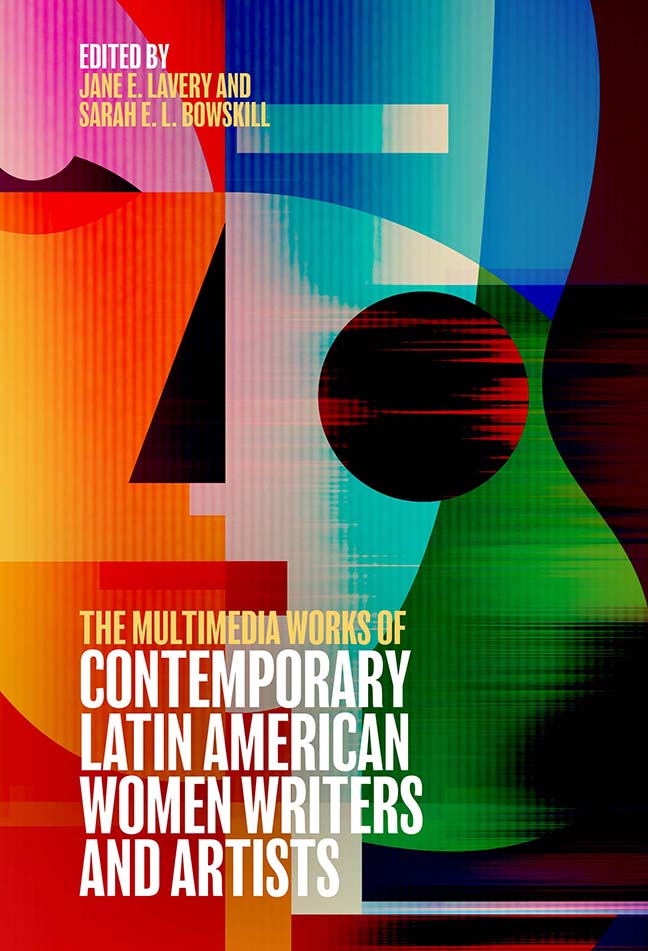Book contents
- Frontmatter
- Contents
- List of Illustrations
- List of Contributors
- Acknowledgments
- Introduction: A Crosscurrent of Contemporary Latin American Women Multimedia Writers and Artists
- 1 The Transliterary: The Novel and Other Multimedia Horizons Beyond (and Close to) the Textual
- 2 Commentary on Fe/males: Sieges of the Post Human (Transmedia Installation)
- 3 An Anthropophagic Ch’ixi Poetics
- 4 My Relationship with Artistic Creation Began with Words
- 5 Imagetext
- 6 Voices/Bodies
- 7 Redefining Meaning: The Interweaving of the Visual and Poetic
- 8 The Territory Is Home
- 9 Reflections on a Multimedia Practice
- 10 Digital Weaving
- 11 Eli Neira, Regina José Galindo, and Ana Clavel: “Polluting” Corporealities and Intermedial/Transliterary Crossings
- 12 The Digital Condition: Subjectivity and Aesthetics in “Fe/males” by Eugenia Prado Bassi
- 13 The Transmedia, Post-Medium, Postnational, and Nomadic Projects of Pilar Acevedo, Rocío Cerón, and Mónica Nepote
- 14 The Art of the Hack: Poets Carla Faesler and Mónica Nepote and Booktuber Fátima Orozco
- 15 The Places of Pain: Intermedial Mode and Meaning in Via Corporis by Pura López Colomé and Geografía del dolor by Mónica González
- 16 Words, Memory, and Space in Intermedial Works by Gabriela Golder and Mariela Yeregui
- 17 Fungibility and the Intermedial Poem: Ana María Uribe, Belén Gache, and Karen Villeda
- 18 Hypertext and Biculturality in Two Autobiographical Hypermedia Works by Latina Artists Lucia Grossberger Morales and Jacalyn Lopez Garcia
- 19 Dialogues Across Media: The Creation of (New?) Hybrid Genres by Belén Gache and Marina Zerbarini
- Bibliography
- Index
- Tamesis
13 - The Transmedia, Post-Medium, Postnational, and Nomadic Projects of Pilar Acevedo, Rocío Cerón, and Mónica Nepote
Published online by Cambridge University Press: 17 December 2023
- Frontmatter
- Contents
- List of Illustrations
- List of Contributors
- Acknowledgments
- Introduction: A Crosscurrent of Contemporary Latin American Women Multimedia Writers and Artists
- 1 The Transliterary: The Novel and Other Multimedia Horizons Beyond (and Close to) the Textual
- 2 Commentary on Fe/males: Sieges of the Post Human (Transmedia Installation)
- 3 An Anthropophagic Ch’ixi Poetics
- 4 My Relationship with Artistic Creation Began with Words
- 5 Imagetext
- 6 Voices/Bodies
- 7 Redefining Meaning: The Interweaving of the Visual and Poetic
- 8 The Territory Is Home
- 9 Reflections on a Multimedia Practice
- 10 Digital Weaving
- 11 Eli Neira, Regina José Galindo, and Ana Clavel: “Polluting” Corporealities and Intermedial/Transliterary Crossings
- 12 The Digital Condition: Subjectivity and Aesthetics in “Fe/males” by Eugenia Prado Bassi
- 13 The Transmedia, Post-Medium, Postnational, and Nomadic Projects of Pilar Acevedo, Rocío Cerón, and Mónica Nepote
- 14 The Art of the Hack: Poets Carla Faesler and Mónica Nepote and Booktuber Fátima Orozco
- 15 The Places of Pain: Intermedial Mode and Meaning in Via Corporis by Pura López Colomé and Geografía del dolor by Mónica González
- 16 Words, Memory, and Space in Intermedial Works by Gabriela Golder and Mariela Yeregui
- 17 Fungibility and the Intermedial Poem: Ana María Uribe, Belén Gache, and Karen Villeda
- 18 Hypertext and Biculturality in Two Autobiographical Hypermedia Works by Latina Artists Lucia Grossberger Morales and Jacalyn Lopez Garcia
- 19 Dialogues Across Media: The Creation of (New?) Hybrid Genres by Belén Gache and Marina Zerbarini
- Bibliography
- Index
- Tamesis
Summary
Pilar Acevedo (born in Mexico and raised near Chicago, 1954) is the author of short stories and poems which often act as companion pieces to her artwork. Rocío Cerón (Mexico City, 1972) and Mónica Nepote (Guadalajara, Jalisco, 1970) explore audiovisual and embodied forms of expression alongside their written poetry. While their backgrounds and relative emphasis on the visual or textual may differ, these women, like others in the volume, are increasingly embracing similar practices. Their work, which is yet to be the subject of sustained critical attention, is united by what Cerón and Nepote, as members of the Motín Poeta poetry collective (2000–10), once termed a “contaminating” ethos. In other words, their work challenges rigid divisions between media as a strategy for creative renewal. The creative dialogue and crossings between media reflect a broader questioning of borders and boundaries. In the works studied here, Cerón's Imperio (Empire) project, the “Hechos diversos” (“Sensationalist News”) section of Nepote's eponymous poetry collection, and Acevedo's assemblage Outcry (2009) and accompanying poem “Morí” (I Died), the crossing and blurring of media borders is used to interrogate the category of the nation as the primary basis for forging allegiances. As the (co-)creators of transmedia and post-medium projects which adopt an outlook based on non-nation-based forms of identification, their work represents a new moment in a Latin American cultural production.
Acevedo, Cerón, and Nepote build on earlier traditions of experimental poetry discussed by Debra Castillo in this volume and by Eduardo Ledesma who describes how such works questioned what the “literary means, what constitutes ‘poetry’ and how, if at all, visual and verbal arts should be differentiated” (Radical Poetry 2). Their work is also a progression following on from that produced by a generation of writers, identified by Emilse B. Hidalgo, who were born after 1960, who came to the fore in the 1990s. Their texts mix “the local with the foreign, the national with the transnational, the popular with high culture, and the traditional with the contemporary and the postmodern” (Hidalgo 109). They are further characterized by “a shift in media – from literature to visual art” as authors increasingly referenced visual culture in their work (Hidalgo 107). Acevedo, Cerón, and Nepote take the next step. They go beyond referencing other media to producing transmedia and post-medium projects.
- Type
- Chapter
- Information
- Publisher: Boydell & BrewerPrint publication year: 2023

